Abstract
The structural relationships of 30 straight-chain fatty acids and derivatives and their bactericidal properties were studied with 8 gram-negative and 12 grampositive organisms. Chain length, unsaturation (cis, trans), and functional group were all variables considered in this study. Our data indicate that C12 (lauric acid) is the most inhibitory saturated fatty acid against gram-positive organisms. Monoenoic acid (C18:1) was more inhibitory than saturated fatty acid, but was less active than dienoic derivatives (C18:2). Other unsaturated compounds were less active than C18:2. Alcohols and glyceryl esters were active only against gram-positive organisms. In general, esterification of the carboxyl group led to a compound which was less active; monoglycerides were the sole exception. Amine derivatives, contrary to results with fatty acids, esters, and amides, showed activity against both gram-positive and gram-negative organisms.
Full text
PDF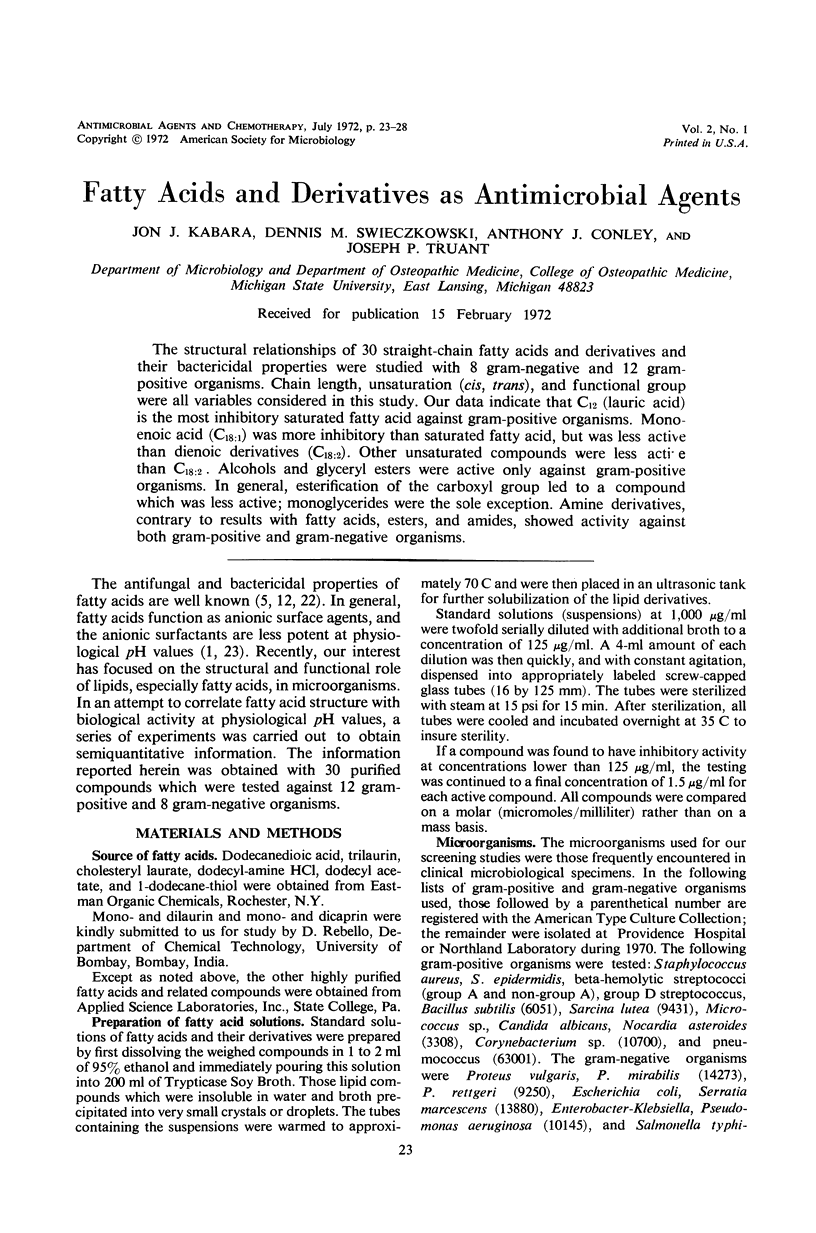
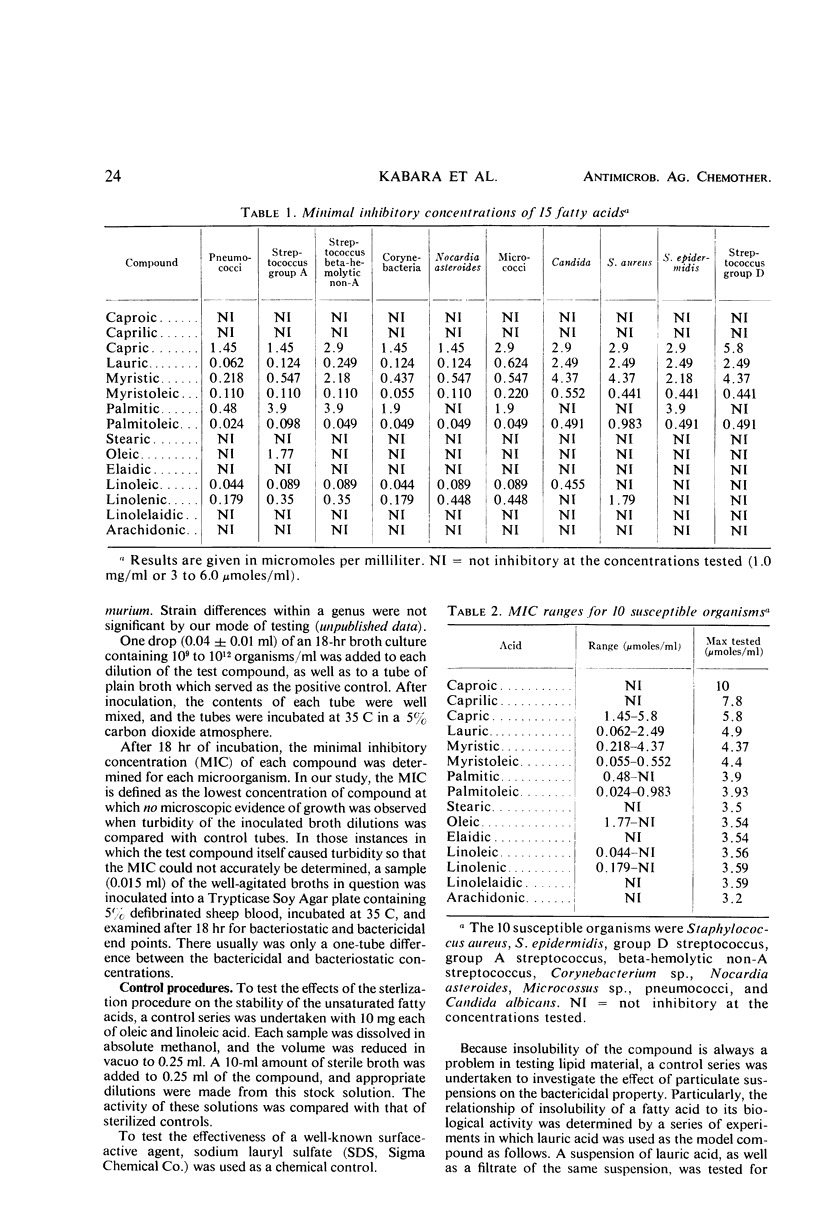
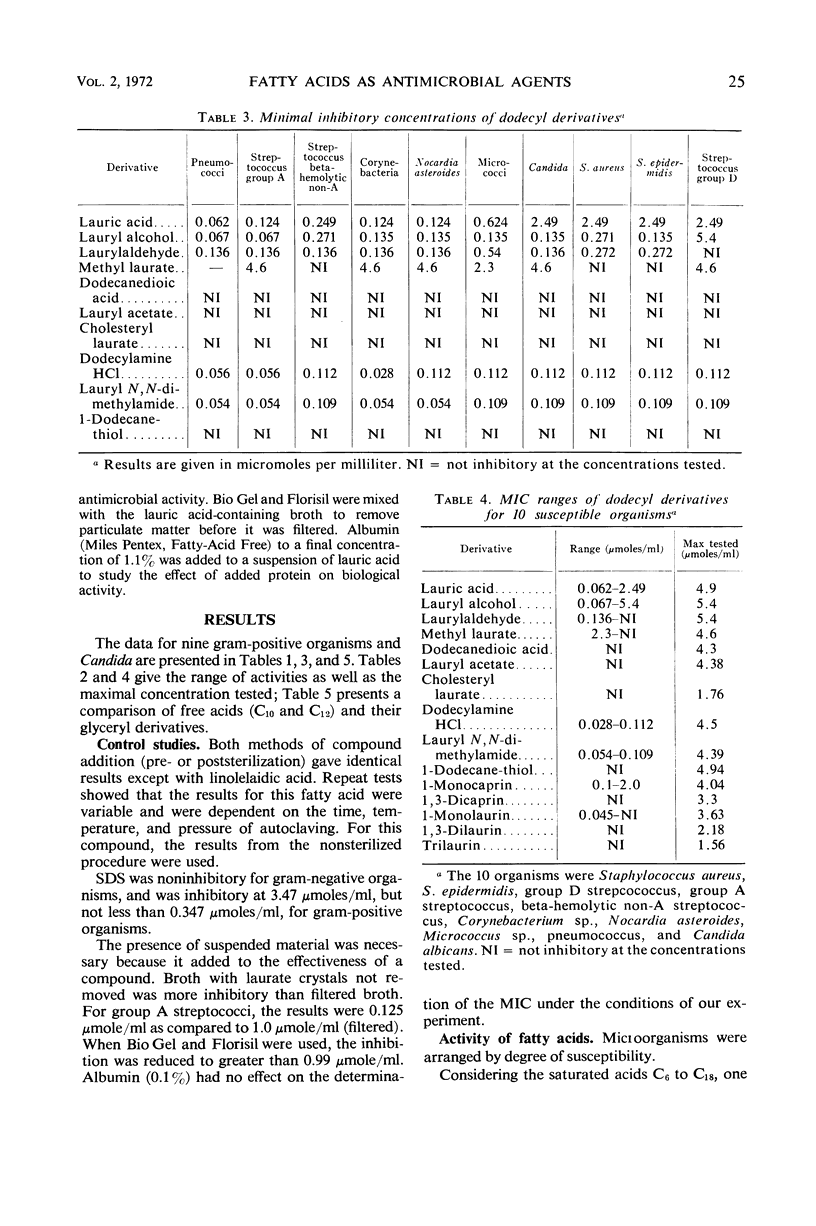
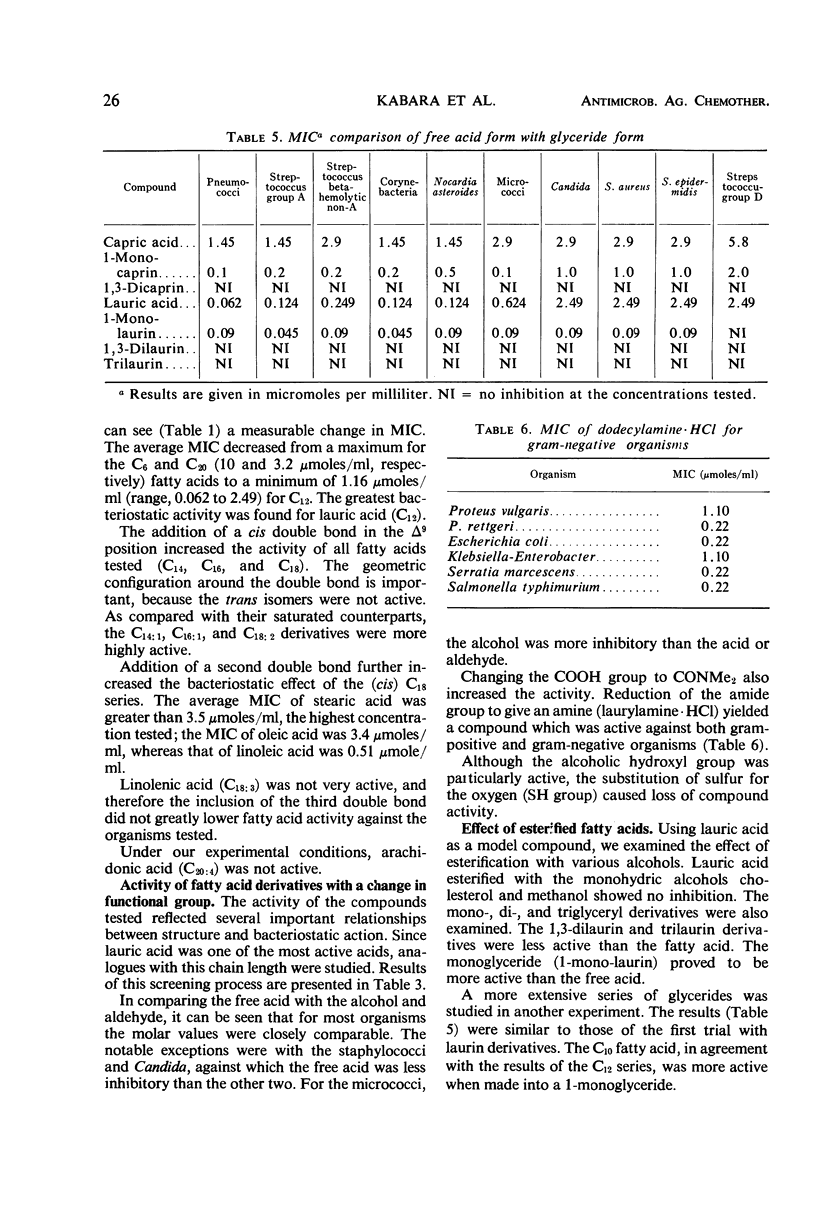
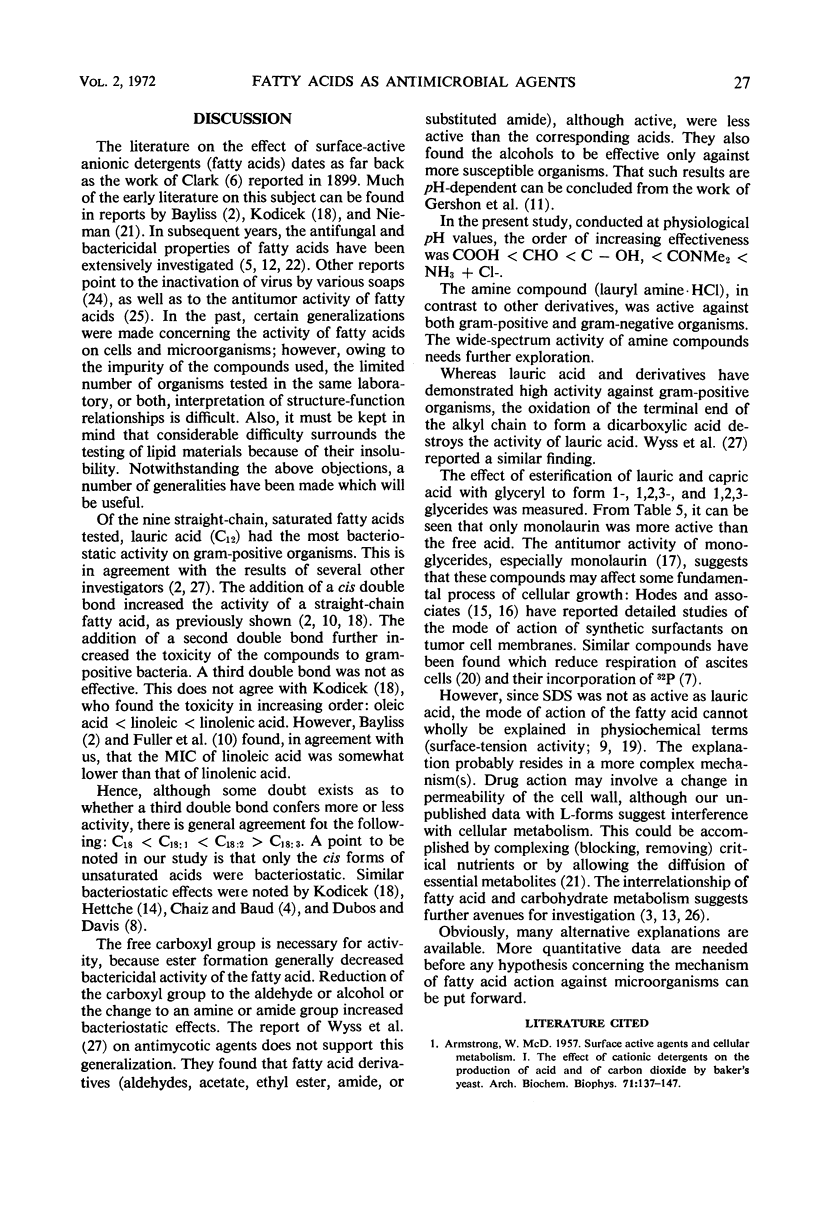
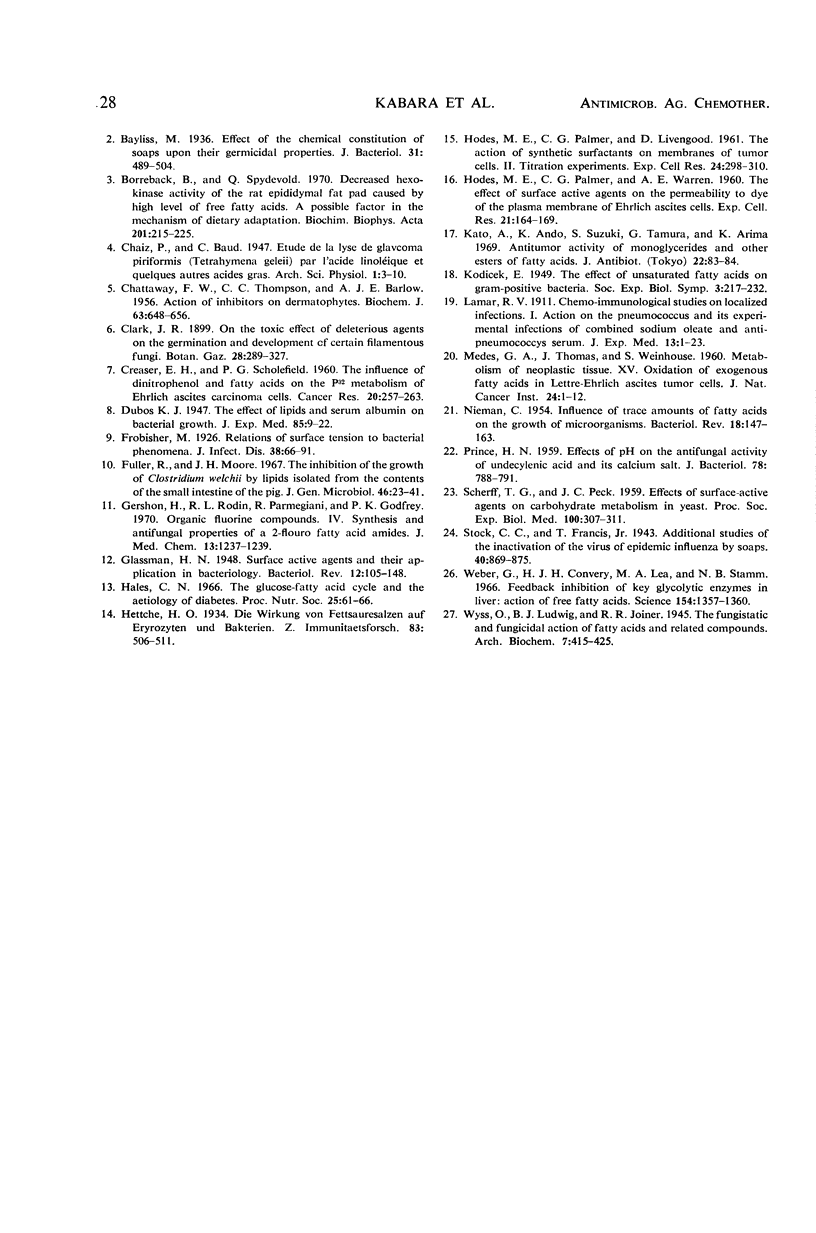
Selected References
These references are in PubMed. This may not be the complete list of references from this article.
- ARMSTRONG W. M. Surface active agents and cellular metabolism. I. The effect of cationic detergents on the production of acid and of carbon dioxide by baker's yeast. Arch Biochem Biophys. 1957 Sep;71(1):137–147. doi: 10.1016/0003-9861(57)90016-4. [DOI] [PubMed] [Google Scholar]
- Bayliss M. Effect of the Chemical Constitution of Soaps upon their Germicidal Properties. J Bacteriol. 1936 May;31(5):489–504. doi: 10.1128/jb.31.5.489-504.1936. [DOI] [PMC free article] [PubMed] [Google Scholar]
- Borrebaek B., Spydevold O. Decreased hexokinase activity of the rat epididymal fat pad caused by high level of free fatty acids. A possible factor in the mechanism of dietary adaptation. Biochim Biophys Acta. 1970 Feb 24;201(2):215–225. doi: 10.1016/0304-4165(70)90295-3. [DOI] [PubMed] [Google Scholar]
- CHATTAWAY F. W., THOMPSON C. C. The action of inhibitors on dermatophytes. Biochem J. 1956 Aug;63(4):648–656. doi: 10.1042/bj0630648. [DOI] [PMC free article] [PubMed] [Google Scholar]
- CREASER E. H., SCHOLEFIELD P. G. The influence of dinitrophenol and fatty acids on the P32 metabolism of Ehrlich ascites carcinoma cells. Cancer Res. 1960 Feb;20:257–263. [PubMed] [Google Scholar]
- Fuller R., Moore J. H. The inhibition of the growth of Clostridium welchii by lipids isolated from the contents of the small intestine of the pig. J Gen Microbiol. 1967 Jan;46(1):23–41. doi: 10.1099/00221287-46-1-23. [DOI] [PubMed] [Google Scholar]
- Gershon H., Rodin R. L., Parmegiani R., Godfrey P. K. Organic fluorine compounds. IV. Synthesis and antifungal properties of 2-fluoro fatty acid amides. J Med Chem. 1970 Nov;13(6):1237–1239. doi: 10.1021/jm00300a057. [DOI] [PubMed] [Google Scholar]
- Glassman H. N. SURFACE ACTIVE AGENTS AND THEIR APPLICATION IN BACTERIOLOGY. Bacteriol Rev. 1948 Jun;12(2):105–148. doi: 10.1128/br.12.2.105-148.1948. [DOI] [PMC free article] [PubMed] [Google Scholar]
- HODES M. E., PALMER C. G., LIVENGOOD D. The action of synthetic surfactants on membranes of tumor cells. II. Titration experiments. Exp Cell Res. 1961 Aug;24:298–310. doi: 10.1016/0014-4827(61)90432-3. [DOI] [PubMed] [Google Scholar]
- HODES M. E., PALMER C. G., WARREN A. The effect of surface active agents on the permeability to dye of the plasma membrane of Ehrlich ascites cells. Exp Cell Res. 1960 Oct;21:164–169. doi: 10.1016/0014-4827(60)90357-8. [DOI] [PubMed] [Google Scholar]
- Hales C. N. The glucose-fatty acid cycle and the aetiology of diabetes. Proc Nutr Soc. 1966;25(1):61–66. doi: 10.1079/pns19660012. [DOI] [PubMed] [Google Scholar]
- Kato A., Ando K., Suzuki S., Tamura G., Arima K. Antitumor activity of monoglycerides and other esters of fatty acids. J Antibiot (Tokyo) 1969 Feb;22(2):83–84. doi: 10.7164/antibiotics.22.83. [DOI] [PubMed] [Google Scholar]
- NIEMAN C. Influence of trace amounts of fatty acids on the growth of microorganisms. Bacteriol Rev. 1954 Jun;18(2):147–163. doi: 10.1128/br.18.2.147-163.1954. [DOI] [PMC free article] [PubMed] [Google Scholar]
- PRINCE H. N. Effect of pH on the antifungal activity of undecylenic acid and its calcium salt. J Bacteriol. 1959 Dec;78:788–791. doi: 10.1128/jb.78.6.788-791.1959. [DOI] [PMC free article] [PubMed] [Google Scholar]
- SCHARFF T. G., BECK J. L. Effects of surface-active agents on carbohydrate metabolism in yeast. Proc Soc Exp Biol Med. 1959 Feb;100(2):307–311. doi: 10.3181/00379727-100-24610. [DOI] [PubMed] [Google Scholar]
- Weber G., Convery H. J., Lea M. A., Stamm N. B. Feedback inhibition of key glycolytic enzymes in liver: action of free fatty acids. Science. 1966 Dec 9;154(3754):1357–1360. doi: 10.1126/science.154.3754.1357. [DOI] [PubMed] [Google Scholar]


